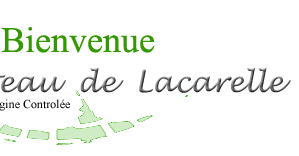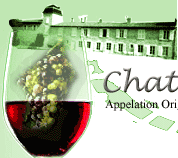|
|
 |
|
 |
|
|
The chateau de Lacarelle give a great importance to the protection of the nature and to the respect of the environment. These choices induce a certain type of cultural methods. We summarized it in this page, from the plantation to the wastewater treatment...
FIGHT AGAINST EROSION
The grounds on which the vines are cultivated is made from the slow decomposition of granit. This is therefore a very poor soil. Sometimes, vines roots are contenting with less than thirty centimeters of a sandy soil, untill they meet an hard boulder.
In order to preserve the value of all the efforts made by the Château de Lacarelle, the vine must keep at his disposal a sufficient soil volume. That the reason why it is essential to limit or stop erosion provoked by even weak rains. The density of water collecting networks and drain canals is the solution and implies heavy investments each year.
USE OF NATURAL FERTILIZER
Close the vine culture zone 30 ha of grass field allow to feed a flock of 150 sheep. The fumier of the sheep is recovered and be used as a basis to the amendements of which the vine need on this very poor ground.
PROTECTION OF VINES AND FRUIT ECOLOGICAL PRACTICES
Insects and mushrooms are a permanent threat on the health of the vine and the quality of grapes. To face this threat, the Château of Lacarelle stretched to combine effectiveness and big prudence in the use of the pesticides. The practice of the "reasoned fight" as a consensus between biological and intensive traditional production process. With the help of the national nature protection services, the chateau de Lacarelle is contributing to the reduction of the use of chemical pesticides
WINERIES WASTEWATERS TREATMENT
In order to produce good wine, it is necessary to use a lot of water (to wash and clean the wine dishes). The Château of Lacarelle engaged itself with the regional Water Agency (Corse Rhône Méditerranée) to treat its wineries wastewaters and to reject in the nature only treated and safe water (DCO<300mg/L). The treatment is done into a two phase biological process that use and improve the natural digestive capabilities of micro-organisms.
1.Forced ventilation: The wastewaters are ventiled inside of a recipient in which comprimed air is being blowed . This process make possible the development of micro-organisms that nourish themselves with the pollution contained into the wineries wastewater.
2.Filtration : The second step consists in leaving the purified wastewaters flow on a prepared planted ground where selected flowers will filter the rest of the pollution. The outgoing of the all process present excellent results regarding to the chemical analyses (DCO <150mg/l). The quantities of pollution are half of the rejection norms.
|
|
|
 |
|
|
|



